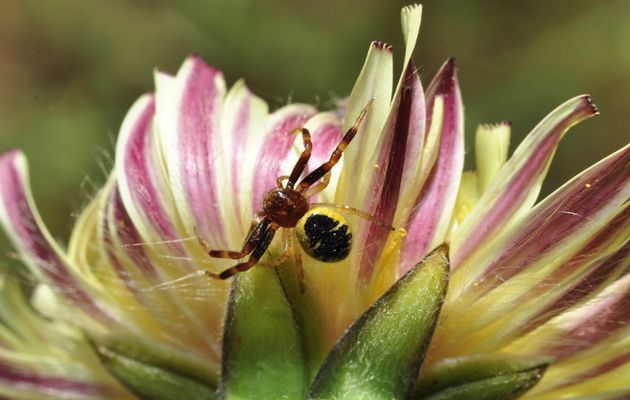The greatest madness, the supreme stupidity of the human being consists in hearing the Word of God, delighting in it, but without wanting to put it into practice.
 Photo: Antonio Cruz
Photo: Antonio Cruz
What they trust in is fragile; what they rely on is a spider's web. Job 8:14
To date more than 46,000 species of spider have been documented in the world. In the Holy Land there are several hundred of them. This is one of the best represented animal groups across all the continents, with the exception of the Antarctic.
They are not insects, but arachnids. The former possess only three pairs of legs, while spiders have four pairs and two front pedipalps which do not touch the ground.
The males of many of these species usually use these appendices to attract females, and insert their sperm-bag into its copulating apparatus.
Arachnophobia, or fear of spiders which these animals generate in some people, is due in part to its appearance and to the fact that it possesses venomous glands to paralyse its prey. However, only a few groups are dangerous for human beings.
One of the distinctive features of spiders, and one which is referred to in the Bible, is their capacity to produce silk webs which can serve a number of purposes: nets to trap prey, coverings for the inside of their dens and even as sails to enable them to move through the air, as in this way they can be carried along by the wind.
Thanks to this means of transport, some spiders can travel more than a thousand kilometres above the sea, or travel upwards to an altitude of up to 5,000 metres.
Although, from a human perspective, the silk threads that spiders produce might seem fragile or not very resistant, what is certain is that when they are examined in detail, they constitute one of the greatest mysteries of biological engineering.
The different types of spider silk are mainly made up of proteins (spidroins) but they also contain traces of glucids, lipids, ionic compounds and some pigments. They normally have a degree of resilience comparable to that of steel.
However, when you take into account the density of these two respective materials (silk and steel), and the comparison is based on a similar quantity of material, it turns out that spider silk is about five times stronger than steel per unit of mass.
What is more, this silk, similar to steel in terms of resilience, can change its shape up to 30% more than this metal. Hence, it is currently regarded as a paradigm for all materials. How could such a structure have originated as a result of chance?
The spider's threads are formed by means of its silk-producing glands, is an area of intense scientific research but the mechanisms remain unclear.
No one understands yet how a material made up of long proteins with such a large molecular mass could remain diluted in the glandular sacks, and then emerge in such a way as to form a solid fibre, which is virtually indissoluble and possesses such mechanical properties.
This implies that it must be regarded as an example of intelligent engineering design rather than the result of a slow, random transformation.
On a different level, the book of Job refers to those who forget God with these words: What they trust in is fragile; what they rely on is a spider's web. They lean on the web, but it gives way; they cling to it, but it does not hold. (Job 8: 14-15). The confidence of the unbeliever is as fragile as a spider's web and will not be able to support him.
The same idea can be found in the story Jesus told about the two kinds of foundation (Matt. 7: 24-29). Good works and personal behaviour are the house and the roots of the tree that give the human being stability.
It is when the torrential Autumn rains and the hurricane force winds of the storms of life put the foundations of our life to the test that it will become obvious whether all we have are the nice looking leafy branches of a comfortable, passive faith, or whether we are supported by the deep roots of Christian responsibility and works of faith.
Some situations in the life of a believer are so complex that they can only be faced and overcome by those who listen to the words of Jesus and put them into practice. By contrast, passive faith crumbles under the weight of such circumstances.
The Master says that the greatest madness, the supreme stupidity of a human being consists in hearing his Word, and delighting in it, but without wanting to put it into practice.
The person whose Christianity is nothing more than religious verbiage, and who is not willing to obey in concrete situations is like someone who has built their house on the sand of a dry river-bed.
It is like building your house on unstable foundations. It will take just the smallest storm to sweep them away, as the the destiny of a person and that of their house are one and the same, in the sense that a man's life is defined by what he builds. Therefore, Let's not waste our time building spider webs.

Las opiniones vertidas por nuestros colaboradores se realizan a nivel personal, pudiendo coincidir o no con la postura de la dirección de Protestante Digital.
Si quieres comentar o